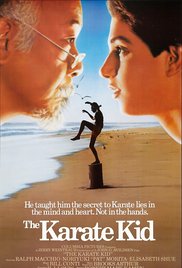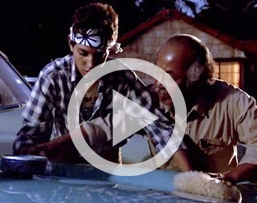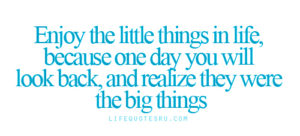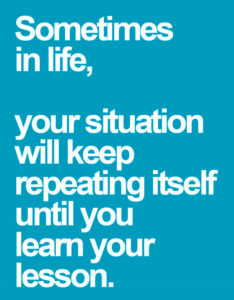Wax on. Wax off.
 As a young child I learned how to wash and wax a car. Because I was the youngest and shortest member of the family I always had the bottom (and, in my humble opinion, the muddiest) part of the car to clean. It was wet, soapy, and messy work, but it paid enough to go get an Icee from the local Pack-a-Sack when we finished.
As a young child I learned how to wash and wax a car. Because I was the youngest and shortest member of the family I always had the bottom (and, in my humble opinion, the muddiest) part of the car to clean. It was wet, soapy, and messy work, but it paid enough to go get an Icee from the local Pack-a-Sack when we finished.
However, after watching The Karate Kid (1984), washing and waxing my vehicle has never been boring. In fact, it is quite entertaining as I repeat the lines “Wax on” and “Wax off” as I clean. No, I never learned karate, but I did learn a few life lessons from watching that movie. Here are my top five.
1. Yes or No. There is no “guess so.” When Mr. Miyagi (Pat Morita) asked Daniel (Ralph Maccio) if he was ready to learn Karate, Daniel’s response of “I guess so” angers Mr. Miyagi. Miyagi compared Daniel’s lame response to walking down a road: walking on left side of road is fine, walking on right side of road is fine, but walking down the middle of the road will eventually get you squished. You have to make a choice.
If you are going to eat healthier, you can’t try it for a week or two while going out every night to McDonald’s. If you want to lose weight, you have to eat less and move more. You can’t just think about doing it and wish you could do it. As Yoda, my favorite Star Wars character would say, “Do or do not. There is no try.”
2. First learn stand, then learn fly. Mr. Miyagi has agreed to teach Daniel karate on the condition that Daniel does everything he says to do and doesn’t ask questions. Daniel desperately wants to learn how to do the Crane Kick. In order to do the kick, one has to have incredible balance, intricate form, and a lot of confidence.
If Daniel had gone straight to the stump to learn the kick, he would have failed. He had to build up to being able to accomplish his goal. Oftentimes, we want to rush our growth, but it’s unnecessary and can even be counterproductive. If you put in the hard work, the rewards will come.
3. No such thing as a bad student, only bad teacher. Teacher say, student do. Mr. Miyagi repeated this to Daniel to reinforce that the responsibility for learning is placed first upon the teacher who will deliver instruction and guide students. As teachers, parents, friends, and family members, we need to look at our own reflection first, before we ever criticize the learner.
It’s also essential that the student does what the teacher tells him or her to do. Daniel wanted to ask questions about Mr. Miyagi’s methods of instruction, but he didn’t have the experience or knowledge to know what was best. Following the instruction was key to his winning the competition.
4. There are 2 rules of Miyagi Karate. Rule Number 1: Karate for defense only. Rule Number 2: First learn rule number 1. Just because you can overpower someone, doesn’t mean you should. This can be physical or mental. Most people understand Rules 1 & 2 when the person is bigger or knows martial arts. It should be for defense only.
I’d like to share an example of Mental Rules 1 & 2. One of the greatest educational theorists I’ve ever met is Bob (Robert) Marzano. At a learning conference we were asked to form a value line indicating our level of understanding of his theories. We tried to put him at the front of the line. After all, they were his theories. Marzano wouldn’t do it. He said that others understood it better and were the practitioners using the strategies on a daily basis. He went to the middle of the line. His humble attitude helped us all to learn more from him.
5. Wax on. Wax off. Mr. Miyagi has Daniel doing chores around his house such as waxing all of his cars, painting his fence, and sanding his floors. Daniel fails to see any connection from the chores to his Karate training. He thinks Mr. Miyagi is using him, not teaching him. (Sound familiar parents?)
Finally, after much practice with specific movements (wax on and wax off are clockwise and counter-clockwise motions), Miyagi reveals that Daniel has been learning defensive blocks through muscle memory performed by the chores. Daniel is then amazed at what he has learned through what he thought were mundane tasks.
After becoming a parent and teacher, I’ve gained a lot of admiration for Mr. Miyagi. He persevered in teaching Daniel—even when Daniel was griping and complaining. Miyagi remained calm and persistent in his expectations for what he knew was best for his student. In today’s world of 90-seconds-or-less satisfaction, sticking to your principles and doing what is best for your students/children is challenging. Those who do it have my greatest admiration!

Miyagi: First, wash all car. Then wax. Wax on…
Daniel: Hey, why do I have to…?
Miyagi: Ah ah! Remember deal! No questions!
Daniel: Yeah, but…
Miyagi: Hai! [makes circular gestures with each hand]
Miyagi: Wax on, right hand. Wax off, left hand. Wax on, wax off. Breathe in through nose, out the mouth. Wax on, wax off. Don’t forget to breathe, very important.
Last life lesson from Karate Kid?
Remember to breathe!



